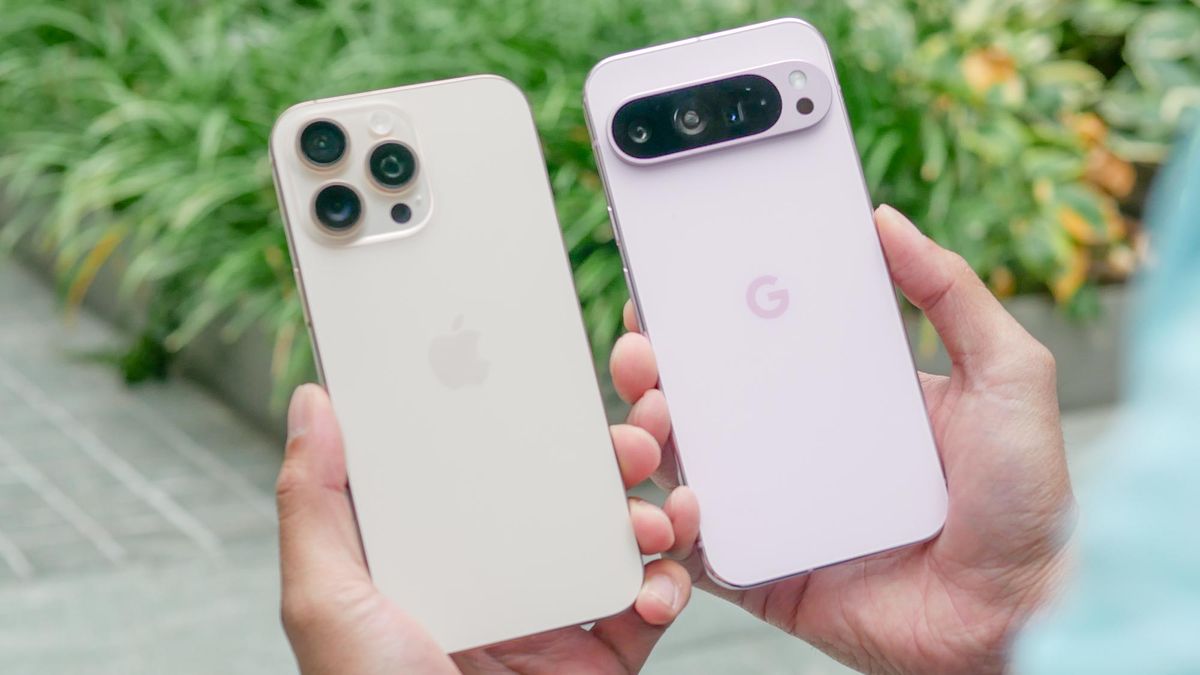After spending nearly a year with the Pixel 8 Pro, I was excited for its spiritual successor with the Pixel 9 Pro XL, mainly for its new AI features and upgraded cameras. But now that the iPhone 16 Pro Max is finally official after being the last flagship announcement for 2024, I’m really curious to see how these juggernauts stack up.
That’s why an iPhone 16 Pro Max vs. Pixel 9 Pro XL face-off is necessary to definitely say which is worth your money. In my Pixel 9 Pro XL review, I mention how it sets a new record with one part of Tom’s Guide’s benchmark testing — while in our iPhone 16 Pro Max review, we saw how much more battery life it gets over last year’s model.
Not only are they similar in size and features, but they also prove how AI is increasingly becoming an integral part in how they’re being used. In fact, I’d argue that they’re reshaping our routines by saving us time. Both phones are strong contenders in our best phones list, but my iPhone 16 Pro Max vs. Pixel 9 Pro XL comparison will determine a winner.
iPhone 16 Pro Max vs. Pixel 9 Pro XL:
| Row 0 – Cell 0 | iPhone 16 Pro Max | Pixel 9 Pro XL |
| Price | $1,199 | $1,099 |
| Display | 6.9 inches | 6.8 inches |
| Refresh Rate | 120Hz adaptive | 120Hz adaptive |
| CPU | A18 Pro | Tensor G4 |
| Storage | 256GB, 512GB, 1TB | 128GB, 256GB, 512GB, 1TB |
| Rear Cameras | 48MP main, 48MP ultrawide, 12MP telephoto (5x optical zoom) | 50MP main, 48MP ultrawide, 48MP telephoto (5x zoom) |
| Front Camera | 12MP | 42MP |
| Battery | 4,685 mAh | 5,060 mAh |
| Colors | Black, White, Desert and Natural Titanium | obsidian, porcelain, hazel, rose quartz |
| Size | 6.42 x 3.06 x 0.32 inches | 6.4 x 3 x 0.3 inches |
| Weight | 8 ounces | 7.8 ounces |
iPhone 16 Pro Max vs. Pixel 9 Pro XL: Price
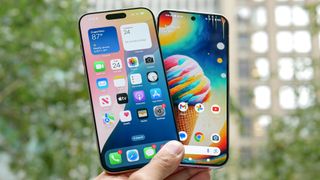
Despite costing more than its predecessor, the $1,099 starting cost of the Pixel 9 Pro XL still comes out to be cheaper than the $1,199 priced iPhone 16 Pro Max. However, you’re only getting 128GB of storage with the Pixel 9 Pro XL versus 256GB with the iPhone 16 Pro Max. In order to match its rival’s storage capacity, you’d have to shell out the same $1,199 cost for 256GB of storage with the Pixel 9 Pro XL.
This is a stark change compared to prior years because Google’s flagship has often been priced for much less. But that’s not the case anymore, which I think puts the Pixel 9 Pro XL in awkward position.
Winner: Tie
iPhone 16 Pro Max vs. Pixel 9 Pro XL: Design
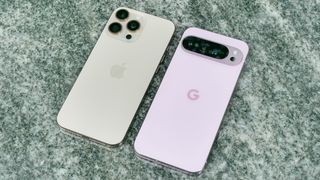
This one’s tough because there’s a lot I like about each phone design. For starters, they radiate with premium materials and construction that make them every bit worthy of their flagship statuses.
These two couldn’t be any similar with their designs, like how they feature flat edges and rounded corners, along with their metal meets glass constructions. However, the iPhone 16 Pro Max features a more sturdy titanium alloy frame than the polished aluminum of the Pixel 9 Pro XL. But since I’ve kept both phones in a case most of the time, this doesn’t have as much of an impact for me.
What stands out for me is how the Pixel 9 Pro XL is slightly lighter and compact of the two. It’s still a big phone, but it’s not as heavy or tall as the iPhone. And what finally makes the Pixel 9 Pro XL’s design better is how there are a couple of bolder color options to choose from (like the rose quartz color of my review unit), rather than having to settle for the iPhone 16 Pro Max’s neutral tones.
Winner: Pixel 9 Pro XL
iPhone 16 Pro Max vs. Pixel 9 Pro XL: Display
For those with an affinity for big phones, they’ll like what these two offer. Apple fashions a larger 6.9-inch Super Retina XDR display into the iPhone 16 Pro Max, while somehow being able to chip away at the bezels. Meanwhile, the Pixel 9 Pro XL packs a 6.8-inch Super Actua display with a tiny pinhole for its front-facing camera.
| Row 0 – Cell 0 | iPhone 16 Pro Max | Pixel 9 Pro XL |
| Delta-E color accuracy (lower is better) | 0.24 | 0.28 (Natural), 0.24 (Adaptive) |
| DCI-P3 color gamut coverage (%) | 80.4 | 74.4 (Natural), 82.8 (Adaptive) |
| Peak brightness | 1,553 nits | 2,469 nits |
I will say that the two displays are perfect for watching videos and playing games, thanks in part to how their OLED panels have a strong contrast look with colors that pop. However, our testing reveals how the Pixel 9 Pro XL has the brighter screen with a peak output of 2,469 nits — making it the brightest screen we’ve ever recorded on a phone to date.
By comparison, it blows away the iPhone 16 Pro Max’s meager reach of 1,553 nits. While I didn’t find much disparity between the displays indoors, there’s a big difference when it’s outside with the sun shining down on them. That’s where the Pixel 9 Pro XL’s display goes into overdrive by radiating more brightness to make it more visible.
Winner: Pixel 9 Pro XL
iPhone 16 Pro Max vs. Pixel 9 Pro XL: Cameras
Taking photos is such a breeze with both phones, which also helps when they capture some outstanding shots. Plus, I like how they offer extra utility in being able to capture just about any shot because their triple cameras cover a huge spread. It’s no wonder why they’re two of the best camera phones around.
Apple arms the iPhone 16 Pro Max with a 48MP main shooter, refreshed 48MP ultrawide, and a 12MP telephoto with 5x zoom. It’s a good matchup against the Pixel 9 Pro XL’s setup, which includes a 50MP main camera, 48MP ultrawide, and 48MP telephoto with 5x zoom.
There are things I love about both camera phones, like how the iPhone’s new Capture Control button gives me a few controls at the tip of my finger, or like how the Pixel 9 Pro XL can auto track subjects to lock in the focus on them even when they move around.
But of course, it comes down to how their cameras perform to deliver the best results. I actually took over 200 photos between the iPhone 16 Pro Max and Pixel 9 Pro XL to determine which is the better one for photography, so I’ll summarize my favorites shots from it.
When the conditions are right, both phones take excellent shots that are worthy of sharing on social media. I took these shots down by the beach and when I look closely into the images, they do capture a fair amount of the textures with the Adirondack chairs. However, the iPhone 16 Pro Max’s warmer color temperature and brighter image takes my vote here.
Both phones get refreshed ultrawide cameras, but the Pixel 9 Pro XL has the wider 123-degree field of view to get more of the church and surrounding area in frame over the iPhone’s 120-degree FOV. Beyond that, I still prefer how the colors pop out more with the Pixel’s shot, along with how it captures more of the fine details in the stained glass windows.
It’s really unbelievable what kind of images they’re able to pull off with macro photography. Between them, however, my eyes gravitate more on the iPhone’s snapshot because of the amount of detail it uncovers, like the pollen around the petals and the hidden spiker right smack in the middle. In contrast, the Pixel 9 Pro XL’s shot still has plenty of detail, but it doesn’t quite have the same level of definition — and it’s more aggressive with the color saturation.
Not only does it capture more of me in the shot with its wider field of view, but the Pixel 9 Pro XL’s 42MP selfie captures sharper details around my face — like my hairline and all of my wrinkles. I’ll give it to the the iPhone 16 Pro Max for doing a decent job with its 12MP selfie camera, but the Pixel’s better overall.
I’m surprised by how close they match up against each other in the zoom department. I captured the shots above at 5x zoom, and while they both appear very similar with their clarity and detail. The letters around the sign and giant eye in the middle prove this, but the only difference I can make out is how the iPhone 16 Prop Max slightly boosts the exposure in the shadowed areas of the tree’s branches in the lower left side.
And lastly, I want to talk about low light because the iPhone 16 Pro Max’s main camera does a swell job at brightening the pitch black conditions of my backyard above. Not only is the iPhone’s image brighter, but it also manages to capture more detail with the tree and its branches.
Even though the iPhone 16 Pro Max ultimately wins in this category, the Pixel 9 Pro XL isn’t too far off from what it delivers.
Winner: iPhone 16 Pro Max
iPhone 16 Pro Max vs. Pixel 9 Pro XL: Performance
Without taking into account the results from various synthetic benchmark tests that were run on both phones, the iPhone 16 Pro Max and Pixel 9 Pro XL both match each other in terms of responsiveness. For example, they’re both accompanied by fluid animations and actions navigating around their interface — so I don’t see one better than the other when it comes to basic everyday functions.
| Row 0 – Cell 0 | iPhone 16 Pro Max | Pixel 9 Pro XL |
| Geekbench 6 (single-core/multicore) | 3,400 / 8,341 | 1,929 / 4,747 |
| 3DMark Wild Life Extreme Unlimited (fps) | 107.53 | 55.63 |
| Adobe Premiere Rush time to transcode (mins:secs) | 0:21 | N/A |
However, benchmark scores tell a different story. That’s because the A18 Pro puts up the better scores. For starters, it easily pushed past the Tensor G4 in Geekbech 6 with its single and multicore scores of 3,400 and 8,341 respectively. In comparison, the Tensor G4 delivers scores of 1,929 and 4,747 running the same tests.
It doesn’t stop there because in 3DMark’s Wild Life Unlimited test, the iPhone 16 Pro Max is a champ at delivering the faster 107.53 fps frame rate rendering graphics, which is nearly double the Pixel 9 Pro XL’s 55.63 fps frame rate. I know very well that the two are more than capable of running any gaming title without much lag, but the iPhone 16 Pro Max’s faster frame rates is more suitable here.
iPhone 16 Pro Max vs. Pixel 9 Pro XL: Battery life
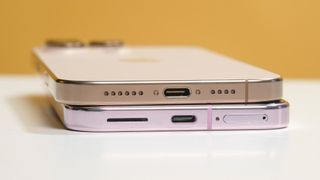
Phone makers are continually packing on bigger batteries, but this face-off proves that a chipset’s power efficiency can make all the difference. Just by looking at their battery sizes, one could easily think that the Pixel 9 Pro XL would be better in the battery life department because the iPhone 16 Pro Max’s 4,685 mAh battery isn’t close to matching the 5,060 mAh battery in the Pixel.
| Row 0 – Cell 0 | iPhone 16 Pro Max | Pixel 9 Pro XL |
| Battery Life (hours:minutes) | 18:06 | 14:37 |
| Recharge Level in 15 mins | 29% | 35% |
| Recharge Level in 30 mins | 55% | 63% |
Yet, the iPhone 16 Pro Max is able to deliver incredibly longer battery life with its remarkable time of 18 hours and 6 minutes. That’s almost 4 hours longer than the Pixel 9 Pro XL’s time of 14 hours and 37 minutes. This shows the superior power efficiency of the A18 Pro in the iPhone 16 Pro Max, which is made more impressive given how it’s also working with a larger screen.
Over on the recharge side, the Pixel 9 Pro XL’s faster 37W wired speed allows it to charge faster — reaching 63% in 30 minutes, versus the iPhone’s 55% capacity. I personally favor battery life over recharge time because it means I’ll be able to get more out of a phone before needing to charge it.
Winner: iPhone 16 Pro Max
iPhone 16 Pro Max vs. Pixel 9 Pro XL: Software and AI
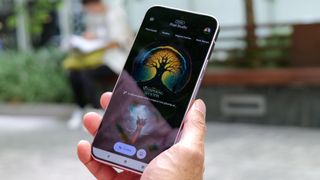
This is where it gets interesting because their software plays more of a critical role to establish how much value they offer. You have iOS 18 on the iPhone 16 Pro Max and Android 14 with the Pixel 9 Pro XL.
While Google oddly enough decided to launch its phone with Android 14 out of the gate, it shouldn’t be long now before it sees Android 15, which will add even more features to the experience that aren’t found in my review. Meanwhile, the iPhone 16 Pro Max comes with iOS 18, but Apple Intelligence will come in a future update.
On the surface, they both offer a lot to offer with their software — like deeper customization with their home and lock screens, while also focusing on privacy at the same time. The Android versus iPhone conversation has long been around, and for the most part, they serve a wide audience well.
What makes them different (and more important) than past comparisons is how their AI features redefine their experience. I’ve said previously how the Pixel 9 Pro XL is still the AI phone to beat, and that doesn’t change at all after I’ve tested some Apple Intelligence features with the iOS 18 beta release.

Part of it is because Apple Intelligence is just getting caught up to what Google has been doing now for years with its Pixel phones. Both share commonalities like being able to summarize web pages and articles, easy photo editing with the help of generative AI, and as well as giving me unique grammar and writing styles that are written with the help of AI. Yet, it’s the Pixel 9 Pro XL that has a deeper, more robust offering with its AI features.
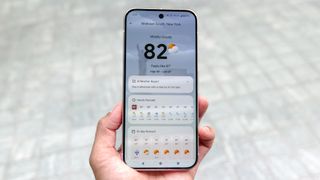
For example, I cannot tell you how frequently I use Circle to Search to look up information with the camera — like finding shopping deals on gadgets I want, or figuring out the type of weed I come across on my lawn and how best to eradicate it. There’s also how Gemini Live feels more like I’m talking to a real human being, in addition to its ability to research stuff on my behalf. I’m still impressed by how it forecasted the true cost of owning an electric vehicle versus a gas-powered one.
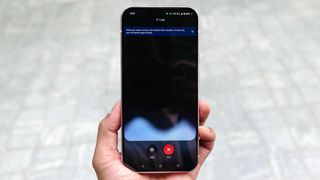
The iPhone 16 Pro Max can’t do this yet, but it could very well match it when ChatGPT integration is rolled out with the software. Either way, it feels like the iPhone 16 Pro Max is playing catchup to what the Pixel 9 Pro XL offers.
Winner: Pixel 9 Pro XL
iPhone 16 Pro Max vs. Pixel 9 Pro XL: Verdict
This one turned out to be a lot closer, but it’s still the iPhone 16 Pro Max that pulls slightly ahead in this face-off. Most notably, it earns high marks in areas like its outstanding battery life, processing performance and exceptional cameras. Obviously, it’ll only get better once Apple Intelligence is released.
| iPhone 16 Pro Max | Pixel 9 Pro XL | |
| Price (15 points) | 13 | 13 |
| Design (10 points) | 9 | 10 |
| Display (15 points) | 14 | 15 |
| Cameras (20 points) | 20 | 18 |
| Performance (15 points) | 15 | 13 |
| Battery and charging (10 points) | 9 | 7 |
| Software and AI (15 points) | 13 | 15 |
| Total (out of 100) | 93 | 91 |
As for the Pixel 9 Pro XL? It makes more of a statement around its software and AI features, which are currently a giant step ahead of what its rival offers. The only downside is how Google increases its price, so it doesn’t have the same level of savings compared to its predecessors. Usually that would’ve been enough to give people reason to buy it, but that’s not the case anymore.

